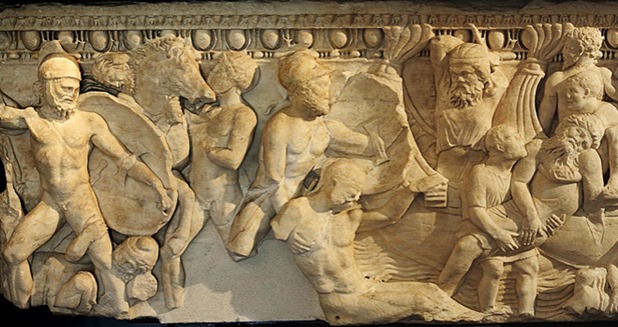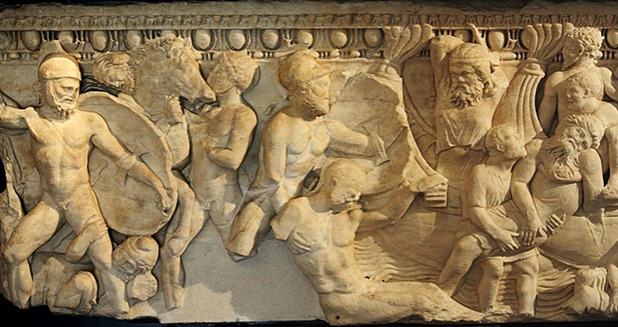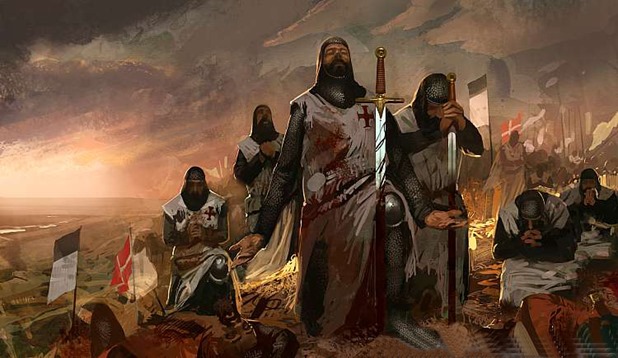Crisis Magazine
July 17, 2015

The current issue of Foreign Affairs published an essay by Ivan Krastev and Mark Leonard called “Europe’s Shattered Dream of Order: How Putin Is Disrupting the Atlantic Alliance.” The authors cite a 2014 WIN/Gallup International survey reporting dismal results from respondents regarding the virtue of patriotism in Europe. Only 29 percent of French respondents, 27 percent of Brits, and 18 percent of Germans said they would fight for their country. A shocking 68 percent of Italians said they would positively refuse to defend their nation. (Giuseppe Garibaldi shouldn’t have troubled himself.) Globally, 3/5 of the population would fight for their country. The statistic needs parsing; 77 percent of that 3/5 comes from Middle Eastern and North African regions (MENA). Asian nations are second in willingness to fight for their flags at 71 percent. A meager 25 percent of Western Europeans would fight for their lands. In the U.S., 44 percent of respondents said they would take up arms for our nation. The timing of the survey was intentional, coinciding with centennial remembrances of the Great War. As the dark specter of nationalism casts an increasingly ominous shadow across Asia and Eastern Europe, western Europeans continue to inebriate themselves at the fountain of nihilism.
America’s recruitment prospects also are poor, but for a different reason: obesity. According to Army figures reported by Carol Costello of CNN in April, 10 percent of recruits are disqualified because of obesity. Maj. Gen. Allen Batschelet, commander of Army recruiting, warned that obesity could become a national security threat. Based on current trends, the Army believes that by 2020, only 2 of 10 recruits will qualify because of obesity. “The spirit is willing but the flesh is weak.” We are too fat to fight.
Another threat to patriotism is atomization. Contra the vacuous promises of service providers, technology continues to isolate us from one another, sealing us up in self-constructed cocoons of downloaded music and “tweets.” Even movie-going has become an increasingly isolated activity with the advent of “home theater” systems. Americans now value personal rights more than communal safety according to a 2011 Associated Press-NORC Center for Public Research survey in which people were asked which they would choose between personal freedoms and protecting fellow citizens from terrorism. 54 percent of respondents prioritized individual rights. Some were fatalistic about it. “If they really want to hit us,” their thinking goes, “they will.” Underlying this attitude is a shirking of responsibility to the community, the very community that provides the opportunities and presumed “rights” these people now demand. In antiquity, each free-born man understood his duty to the polis. This is why even the poor, ill-equipped citizens of Athens marched out against the Persians at Marathon with nothing more than javelins and cutlasses. Europeans should know better. Most potentially world-changing battles were fought on European soil. Two particularly come to mind in light of the survey cited by Krastev and Leonard.
In 490 B.C., Attica, the taproot of western culture, teetered on the brink of destruction. Only Sparta and Athens refused Darius’ tributary demands of earth and water. The rest of Greece bent the knee to Persian power. After sacking Eretria, the Persians beached along the east coast of Attica. Athenian generals convened a war-council on a mountain slope overlooking the plain of Marathon, where the full might of Persian power was visible below. The mere thought of the Persian military struck fear into the hearts of most Greeks. As Sir Edward Creasy wrote in The Fifteen Decisive Battles of the World, the Persians “had more than once met Greek troops in Asia Minor, in Cyprus, in Egypt, and had invariably beaten them. Nothing can be stronger than the expressions used by the early Greek writers respecting the terror which the name of the Medes inspired…” Athenian leadership was simple and sound, comprised of eleven men; ten generals, elected annually, each governing one of the ten tribes of Athens, and a Polemarch, or War-Ruler, which at this time was a nobleman named Callimachus. The War-Ruler held the honored position of leading the right flank of the Greek formation. He also would cast the deciding vote in the event of a tie among the ten generals. High above the plain of Marathon, five generals voted to give fight to the Persians, five were against. Miltiades, a general who distinguished himself among his peers, exhorted Callimachus to cast the decisive vote.
Though severely outnumbered and without archers or cavalry, the Greeks took swift battle to the Persians, beating them back to their ships. Importantly, the Athenian generals were wise enough to make Miltiades their Commander-in-Chief. His strategic innovations proved indispensable. It’s interesting to note that the Athenian military was comprised of a wide variety of men, including playwrights. Aeschylus fought in this battle. His brother was killed at Marathon attempting to take a Persian ship. The War-Ruler Callimachus was also killed during the attempt to burn or capture the Persian ships after the Athenians had beaten the enemy off the plain. Herodotus reports that 6400 Persians were killed while 192 Athenians were lost. Sir Creasy noted the immense significance of the Greek victory, asserting Marathon “secured for mankind the intellectual treasures of Athens, the growth of free institutions, the liberal enlightenment of the Western world, and the gradual ascendancy for many ages of the great principles of European civilization.”
By 732 A.D., the Saracens had, in Gibbon’s words, achieved “a victorious line of march … prolonged above a thousand miles from the rock of Gibraltar to the banks of the Loire.” He notes that repeating the same distance would bring the Saracens into Poland and the Highlands of Scotland. Gibbon concludes his observation sarcastically musing on what may have resulted. “Perhaps the interpretation of the Koran would now be taught in the schools of Oxford.” It was not to be, thanks to the valor of a patriotic Frank named Charles Martel. Christians might also thank Clotilda, the sixth century Merovingian queen who prayed ceaselessly for the conversion of her husband and king, Clovis I. Clovis received baptism and the land between the Loire and Rhine became Christian. Two centuries later the blossoming flower of Christendom was being squeezed in the vice of pagan German tribes to the north and Islam to the south. Islam crossed the Pyrenees and began subjugating Gaul as it had done Spain. Martel mustered his army of perhaps 1500 men against the Saracen force of 40,000 – 60,000 and, in the prairie between Poitiers and Tours, routed the Muslims and killed their commander Abd el-Rahman Al Ghafiqi.
Charles was no friend of the Church, but he was what the Church needed for its survival. In The Making of Europe, Christopher Dawson asserts Charles “used the abbeys and bishoprics to reward his lay partisans, and had carried out a wholesale secularization of Church property.” Charles and the Merovingians “had done nothing for culture and had only furthered the degradation of the Frankish Church.” Nevertheless, Charles manfully defended Christendom against the onslaught of militant Islam. Tours was the last serious Islamic threat to western Christendom until the seventeenth century in Austria. This was largely due to Charles’ two sons, Pepin and Carloman. It was through these sons of Charles that the secular Merovingian dynasty gave way to theocratic Carolingian rule. Less than 30 years after Martel’s death, his grandson Charles would be crowned king of the Franks. He would go on to become Charlemagne, the inaugural ruler of the Holy Roman Empire. Charles Martel’s valor issued in the Carolingian dynasty, which tended the root of Christendom in the heart of Europe. The cooperation between Carolingian rulers and the Church was, in Dawson’s words, “the source of the whole medieval development of culture.” Such a development never would have occurred if Charles Martel and his men had not sacrificed all to save all.
Europeans today would simply give away these treasures of valor as part of some ill-defined economy of peace. They should consider what happened to the Edonians during Xerxes march to Attica. Though the Edonians had paid tribute, the emperor had nine of their boys and nine girls buried alive in their territory. Hitler remains the example par excellence of what results from Faustian bargains with tyrannical aggressors.
Patriotism is always needed because, unlike jingoism, it is a wholesome virtue. It is so because it requires wisdom and valor, sometimes in heroic measure. In antiquity, the gods expected patriotism. In Book IV of Virgil’s Aeneid, Jove sends Mercury to Carthage with a message for Aeneas, who has settled down into a comfortable life with beautiful Dido, a Tyrian queen. Mercury reminds Aeneas that his mission is not to help establish a Phoenician kingdom in Carthage, but to re-establish the glory of Troy in Latium, despite the risks. Aeneas’ father Anchises appears several times adjuring his son that personal comfort and safety must not supplant fidelity to the memory of those who fell defending their beloved city.
The era of great powers conflict is not over. A Chinese general recently remarked that war with the U.S. “is inevitable.” Vladimir Putin, who has a vastly superior knowledge of history to our president, continues to test the commitment of western nations to the promises they made to each other. Christendom has given way to a secularized Europe. War-councils of wise and brave men have given way to an endless proliferation of impotent councils spawned by that bloated leviathan, the EU, which continues to emasculate itself. Europe will defend nothing because she loves nothing; neither her Church, nor her culture, nor her own children (what few there are).
No reasonable person wants war, but America may yet find herself, like the Athenians at Marathon or the Franks at Tours, in a pivotal moment of truth when the future history of the world hangs in the balance. We will need virtuous leaders and valiant, not corpulent, men who will defend the precious heritage of culture that has been preserved for us by western warriors from Callimachus to the Unknown Soldiers. And, despite the president’s talk of “special relationships” with our “friends” across the Atlantic, we now know we are on our own. The only question is whether or not we’ll be fit to fight. Can America produce another great generation?


